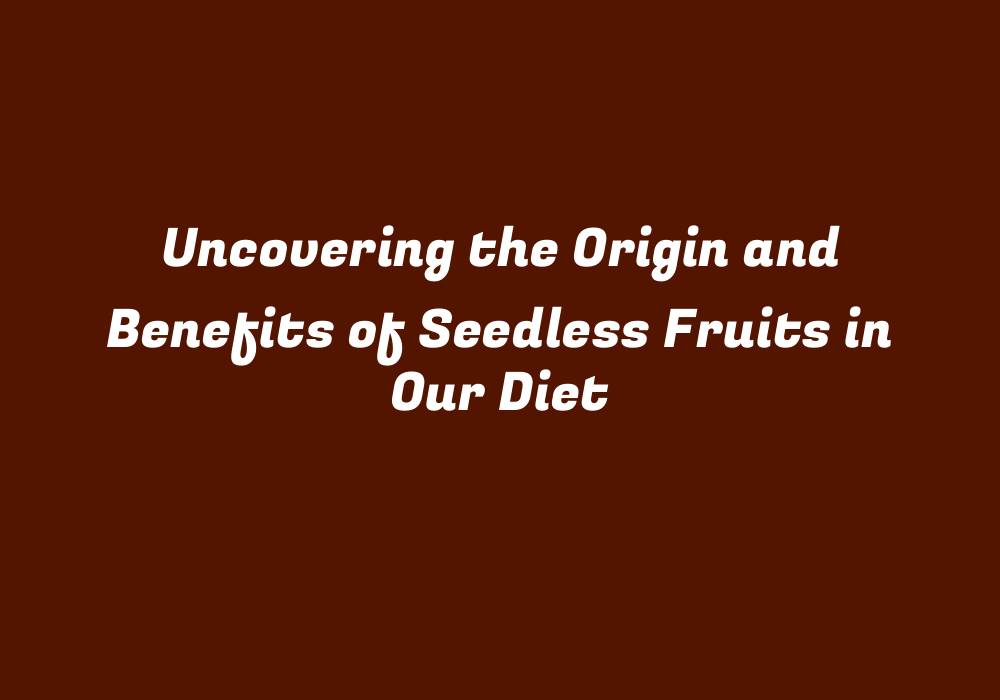Uncovering the Origin and Benefits of Seedless Fruits in Our Diet
Fruits play a significant role in our daily diet, providing necessary nutrients and vitamins that promote overall health. Among the wide variety of fruits available, seedless fruits have become increasingly popular over time due to their convenience and ease of eating. While their popularity is relatively recent compared to many other food sources, understanding the origin and benefits of seedless fruits in our diet can lead us to appreciate them even more.
The Evolution of Seedless Fruits
Seedless fruits have existed since ancient times. Early farmers and horticulturists often used traditional methods, such as grafting and budding techniques, to propagate plants and generate new offspring with the desired characteristics. These techniques involved cross-pollination between different fruit varieties, resulting in a more manageable fruit that did not require seed removal before consumption.
Today, we have various varieties of seedless fruits, including grapes, oranges, melons, watermelons, and many others. These fruits were initially developed through years of controlled cross-pollination or genetic manipulation to achieve the desired trait: seeds that do not form, making them easy to eat and enjoyable without having to spit out the seed or take time removing it. Despite their evolution and mass appeal, seedless fruits remain a relatively young addition to our diet when compared with other food sources.
Health Benefits of Seedless Fruits
Nutritional Value: Like all fruits, seedless varieties provide essential vitamins and minerals that contribute to a balanced diet. They are rich in fiber, which plays a vital role in maintaining good digestive health. The antioxidants found in many seedless fruits also help protect our bodies against free radicals, reducing the risk of various chronic diseases.
Energy Boost: Seedless fruits are often high in natural sugars and carbohydrates, which can provide a quick energy boost when consumed. This makes them an excellent snack choice for people who need an extra pick-me-up during the day or athletes looking to replenish their energy levels after strenuous workouts.
Low Calorie Option: Most seedless fruits are low in calories, making them suitable for individuals seeking to maintain a healthy weight. Consuming a variety of fruits can also promote satiety and help regulate blood sugar levels by preventing sharp spikes or drops in glucose throughout the day.
Convenience Factors
Ease of Eating: One of the main advantages of seedless fruits is the convenience they offer. With no seeds to worry about while eating, these fruits allow people to enjoy them more quickly and without any distractions. This factor makes seedless fruits an ideal snack option for busy individuals or those who don’t have much time to eat their meals.
Versatility: The simplicity of seedless fruits also opens up a wide range of possibilities in the kitchen, allowing them to be incorporated into various dishes and recipes. Their sweetness and delicate flavor can accentuate even the most complex culinary creations while still providing essential nutritional benefits.
Environmental Impact
Reduced Waste: By eliminating the need to spit out seeds, seedless fruits help reduce food waste and contribute positively to environmental sustainability. This aspect is particularly important considering the growing global concern about plastic waste and its impact on our ecosystems.
Preservation of Biodiversity: In some cases, seedless varieties may be more environmentally friendly as they require fewer resources for production compared to traditional seeded fruits. This can lead to a decrease in the land required to grow these crops and promote more efficient use of water, fertilizers, and pesticides, which ultimately benefits overall biodiversity.
Conclusion
In conclusion, seedless fruits have come a long way since their evolution into the popular snack options they are today. Their health benefits, convenience factors, and environmental impact make them an excellent addition to our diet. Whether consumed as a quick energy boost or incorporated into various recipes, these fruits offer numerous advantages that should not go unnoticed.
By understanding the origin and exploring the many positive aspects of seedless fruits in our daily lives, we can appreciate their unique and valuable role in promoting overall health, well-being, and sustainability for generations to come.
